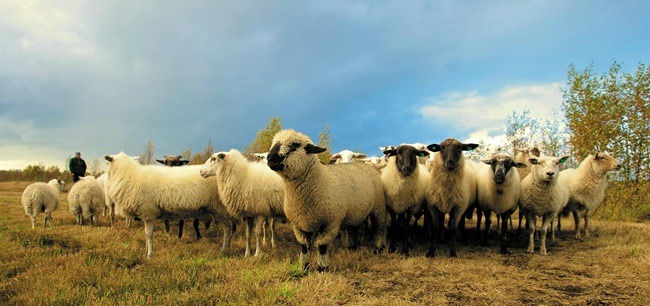
Follow these tips to raise healthier and more profitable sheep.
Observe Your Flock
Try to spend a few minutes daily at non-feeding times looking for any unusual behavior. Don’t put off checking animals that isolate themselves and spend lots of time lying down. Any animal that is not eating calls for immediate attention. Losing a ewe (particularly when she is carrying lambs) puts a major dent in the pocket book.
Flocks are Healthier When Kept Outside
Shade should be available during hot weather. You’ll save on bedding and have less manure to haul, both of which save money. And a well-tended flock creates a pleasant pastoral scene which gives our industry a favorable image
Cut Your Feed Costs by Using Available Pasture
If pasture is limited, can more be rented? Neighbors may even let you use theirs free just for the “mowing.” Be sure the fencing is secure and predator problems are minimized. A pastured flock will need a regular rotation and worming schedule, particularly with the lambs
Consider Supplemental Feed Sources to Cut Costs
Among those used have been corn stalks, turnips, apples, pumpkins, lettuce, cabbage, broccoli, celery, and unsalable bread. Check with grocery stores for some discarded food items. We have used “fines” (crushed corn kernels) and, ethanol by-products are a reported food source for sheep.
Clean, Fresh Water Should Always be Available
Water is your cheapest and most valuable food source. Keep it ice free in the winter and shaded in the summer. Feeding loose sheep mineral as directed is essential to avoid expensive deficiency problems. Use only mineral formulated specifically for sheep with its lower copper levels.
Learn & Practice Health Management Procedures
Hoof trimming, worming, shearing, giving shots, assisting with births, etc., are money savers. Seek professional help with a problem beyond your experience. Sometimes, you can avoid the veterinarian’s trip fee by hauling the animal to the clinic yourself. Learn all you can at each visit.
Shop Around
Health products vary in price. Buy only what you need and make certain dated medications don’t expire soon. You can save money by working with your veterinarian or a knowledgeable sheep person in establishing a sound vaccination program. Some common household items can be a cheaper treatment alternative. Using baking soda and cooking oil to treat bloat, molasses as an energy booster, and Pepto-Bismol for scours are examples.
Improvise, Using Everyday Items to Save Money
Rugs and discarded doors make great windbreaks and small pieces of carpet are comfortable to kneel on when assisting lambs. Pallets can be used for temporary fencing. Plastic jugs can be altered for feed scoops or to disinfect feet. Tarp straps can create a self-closing gate. A hanging tire can be used as a mineral feeder. Bathroom scales can be used to weigh lambs. An old elevator bed with the chain removed makes a durable feeder. The list is endless.
Seek Alternative Markets
Sell to 4-H exhibitors, freezer lambs to individual customers, Easter lamb sales, and other religious holiday events. Ethnic markets have a lot of potential. If you raise a wool breed, spinners may be interested in your fleeces. You can avoid sale barn fees by selling cull ewes privately in the spring as “grass ewes.”
Rigidly Cull All Ewes Not Earning Their Keep
They’re costing you money! That includes non-breeders, late lambers, chronic problem lambers, poor mothers, light milkers, and those whose lambs do not grow well.
Related Articles & Free Email Newsletter Sign Up
How to Prepare Sheep for Healthy Lambing and Kidding
Sheep Are Still Thriving 10,000 Years After Domestication
Sheep Milk Offers High Yields and Great Taste


Comment here